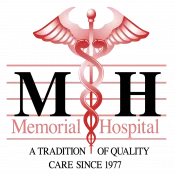Speech Therapy

Our dedicated Speech Therapy team operates within the hospital’s outpatient therapy department, providing comprehensive care to individuals in need. Led by our highly skilled Speech Pathologists, we offer a range of specialized services tailored to address various speech and communication challenges.
- Emergency Room
- Inpatient Acute Care
- Swing Bed
- Inpatient Geriatric Care (Bridges)
- Orthopedics
- General Psychiatry
- Physical Therapy
- Respiratory Therapy
- Speech and Occupational Therapy
- Radiology
- Laboratory
- Pharmacy
- Physicians' Clinic
- Home Healthcare
While we currently have one PRN Speech Pathologist who primarily serves the children at Dahlonegah Schools, she is available to accept referrals for both inpatients and outpatients as needed. Our team of Speech Pathologists is equipped to assist individuals of all ages, helping them overcome difficulties in cognitive function, speech production, swallowing, and memory.
At Stilwell Memorial Hospital, we understand the importance of effective communication and its impact on daily life. Our Speech Therapy services are designed to provide personalized treatment plans that address the unique needs of each individual. Whether you or a loved one are struggling with speech disorders, cognitive impairments, or swallowing difficulties, our experienced team is here to help.

Conditions We Treat With Speech Therapy
- Speech and language disorders: Such as articulation disorders, phonological disorders, apraxia, and stuttering.
- Cognitive-communication disorders: Including difficulties with attention, memory, problem-solving, and executive functioning.
- Swallowing disorders (dysphagia): Helping individuals improve swallowing function and prevent aspiration.
- Voice disorders: Such as vocal nodules, vocal cord paralysis, and vocal quality issues.
- Neurological disorders: Including stroke, traumatic brain injury (TBI), Parkinson’s disease, and multiple sclerosis (MS).
- Developmental delays: Assisting children with delayed speech and language skills.
- Autism spectrum disorders: Addressing communication challenges and social interaction skills.
- Hearing impairment: Supporting individuals with hearing loss in developing communication strategies.
- Accent modification: Aiding individuals in improving pronunciation and reducing accents for communication clarity.
- Cognitive-linguistic deficits: Assisting individuals with cognitive impairments resulting from brain injuries or neurodegenerative diseases.
Always Here – Always Caring.
Schedule Your Speech Therapy Appointment Today
By utilizing evidence-based techniques, cutting-edge technology, and compassionate care, we strive to empower our patients to improve their communication skills and enhance their overall quality of life. Our goal is to support you on your journey towards better communication and independence.
If you or someone you know in the Stilwell area could benefit from our Speech Therapy services, please don’t hesitate to reach out. Our team is ready to assist you in achieving your communication goals.
Committed to helping our patients succeed
Frequently Asked Questions
What Is Speech Therapy?
Speech therapy, also known as speech-language pathology, is a specialized healthcare profession that focuses on assessing, diagnosing, and treating individuals with communication and swallowing disorders. Speech therapists, or speech-language pathologists, work with people of all ages, from infants to adults, who have difficulties in various areas of communication.
Speech therapy targets a wide range of challenges, including speech disorders (such as articulation and fluency disorders), language disorders (such as expressive and receptive language delays), cognitive-communication disorders, voice disorders, swallowing disorders (dysphagia), and more. The ultimate goal of speech therapy is to improve communication skills, enhance speech clarity, foster language development, and address swallowing difficulties to enhance overall quality of life.
Speech therapists utilize various techniques and strategies tailored to individual needs, such as exercises, language-building activities, swallowing therapy, assistive communication devices, and counseling. They work closely with clients and their families to develop customized treatment plans, provide therapy sessions, and monitor progress to help individuals achieve their communication and swallowing goals.
How Much Does Insurance Reimburse for Speech Therapy?
The amount of insurance reimbursement for speech therapy can vary depending on several factors, including the specific insurance plan, coverage details, and individual circumstances. Insurance companies typically have their own policies and guidelines regarding coverage for speech therapy services.
To determine the exact reimbursement amount, it is best to review your insurance plan documents or contact your insurance provider directly. They can provide information on the specific coverage and reimbursement rates for speech therapy services. Additionally, it is important to consider any deductible, copayments, or limitations that may apply to your insurance plan.
How Do I Know If My Child Needs Speech Therapy?
If you’re unsure whether your child may benefit from speech therapy, there are some common signs that can indicate a potential need for intervention. Here are a few indicators to consider:
Speech Delays: If your child’s speech development is significantly behind their peers, such as not babbling by 12 months, saying only a few words by 18 months, or difficulty forming sentences by 2 years, it may be worth seeking an evaluation.
Articulation Issues: Difficulty pronouncing certain sounds or consistently substituting one sound for another (e.g., saying “wabbit” instead of “rabbit”) beyond a certain age can suggest a need for speech therapy.
Language Difficulties: Trouble understanding or using age-appropriate language, such as limited vocabulary, difficulty following directions, or struggling with storytelling, might indicate the need for intervention.
Stuttering: If your child exhibits frequent or prolonged disruptions in their speech flow, such as repeating sounds or syllables, prolonging sounds, or experiencing tense pauses, it could be beneficial to consult a speech therapist.
Social Communication Challenges: Difficulty engaging in age-appropriate conversations, maintaining eye contact, understanding nonverbal cues, or participating in social interactions might suggest a need for speech therapy.
It’s important to note that every child develops at their own pace, and occasional speech errors are common. However, if you have concerns about your child’s speech and language development, consulting with a speech-language pathologist or seeking an evaluation from a qualified professional can provide more specific guidance and help determine if speech therapy is appropriate for your child.
How Does Speech Therapy Work for Toddlers?
Speech therapy for toddlers typically involves a play-based and child-centered approach that focuses on improving communication skills and addressing specific speech and language challenges. Here’s an overview of how speech therapy works for toddlers:
Evaluation: The first step is a comprehensive evaluation conducted by a speech-language pathologist (SLP). The SLP will assess your toddler’s speech and language skills, identify any areas of concern, and establish goals for therapy.
Individualized Therapy Plan: Based on the evaluation results, the SLP will create an individualized therapy plan tailored to your toddler’s specific needs. The plan may include a variety of techniques and activities to target speech, language, and communication goals.
Play-Based Activities: Speech therapy for toddlers often involves play-based activities that are engaging and interactive. The SLP will use toys, games, books, and other age-appropriate materials to encourage your child’s communication skills and make therapy sessions fun and enjoyable.
Targeted Techniques: The SLP will employ various techniques to address specific speech and language challenges. These may include modeling correct sounds or words, using visual cues or gestures, practicing imitation, and incorporating structured exercises to improve speech clarity, vocabulary, grammar, and comprehension.
Parent Involvement: Parents play a crucial role in the success of speech therapy for toddlers. The SLP will provide guidance and strategies for parents to reinforce therapy goals at home. This may involve practicing specific exercises, incorporating language-rich activities into daily routines, and fostering a supportive and communicative environment for the child.
Progress Monitoring: Regular progress assessments will be conducted to track your toddler’s development and adjust the therapy plan accordingly. The frequency and duration of therapy sessions may vary depending on your child’s needs and progress.
Remember, each toddler’s speech therapy journey is unique, and the approach may vary based on the child’s individual requirements. Working closely with a qualified speech-language pathologist will ensure that the therapy is tailored to your toddler’s specific needs and helps them make progress in their communication skills.
What Is Early Intervention Speech Therapy?
Early intervention speech therapy refers to the provision of speech and language therapy services for infants and young children who are at risk for or have already been identified with speech and language delays or disorders. The goal of early intervention is to address communication challenges as early as possible, during the critical developmental period when a child’s brain is highly receptive to learning.
Early intervention speech therapy typically involves a multidisciplinary approach, involving speech-language pathologists, audiologists, occupational therapists, and other professionals, depending on the child’s specific needs. The therapy focuses on promoting age-appropriate communication skills, improving speech clarity, enhancing language development, and addressing any underlying issues that may affect communication, such as hearing impairments or oral motor difficulties.
Early intervention speech therapy may involve various techniques and strategies tailored to the child’s individual needs, such as play-based activities, imitation exercises, speech sound production drills, language stimulation, and parental involvement. The therapy sessions aim to improve the child’s overall communication abilities, including speech articulation, vocabulary development, sentence structure, social interaction, and nonverbal communication skills.
By starting speech therapy early, children have a greater chance of catching up to their peers and achieving age-appropriate communication skills. Early intervention speech therapy can make a significant impact on a child’s development, supporting their ability to effectively communicate, interact with others, and participate in daily activities.
How Do I Know If My Insurance Covers Speech Therapy?
To determine if your insurance covers speech therapy, it is important to review your specific insurance plan. Here are a few steps to help you find out:
Contact your insurance provider: Call the customer service number on the back of your insurance card and inquire about your coverage for speech therapy. Be prepared to provide your policy number and any other relevant information.
Ask about coverage details: Inquire about the specific coverage details for speech therapy, such as the number of sessions covered, any limitations or restrictions, and whether a referral or pre-authorization is required.
Understand your plan’s terms: Familiarize yourself with the terminology used by your insurance plan, such as co-pays, deductibles, and out-of-pocket limits. This will help you understand your financial responsibility for speech therapy services.
Verify network providers: Check if the speech therapy providers you are considering are in-network with your insurance plan. In-network providers usually have negotiated rates with the insurance company, which can help minimize your out-of-pocket expenses.
Request a pre-authorization if needed: If your insurance plan requires a pre-authorization for speech therapy services, work with your healthcare provider to initiate the process. This typically involves submitting relevant documentation and obtaining approval before starting therapy.
Remember, each insurance plan is different, so it’s crucial to review your specific policy details and speak directly with your insurance provider to determine your coverage for speech therapy.
Committed to helping our patients succeed
Our Medical practice areas

Emergency Room
24 hour emergency room services for any type of medical emergency that you may be facing.

Geriatric Psychiatry
Complete medical and psychiatric assessments available as well as evaluations and treatment plans.

Home Health Care
Medicare certified and licensed by the state of Oklahoma, our home health care staff offer outstanding service.

Nursing
Our staff operate with the motto of "Quality care with a positive attitude." and provide outstanding care.

Pharmacy
With an in house pharmacy, our staff ensures that you get proper dosage and medicine administered in a timely manner.

Therapy
We provide a wide range of therapies from various physical therapies to speech therapy for all children and adults.

Radiology
Our radiology team provides exceptional medical imaging services to help you and your doctor make important decisions.

Respiratory Therapy
We offer both inpatient and outpatient visits. Our resources include Holter Monitor treadmill and More.

Bridges (Geriatric Care)
Our Bridges program provides excellent geriatric care by providing psychiatric, diagnostic and treatment services for patients facing the struggles of aging.

